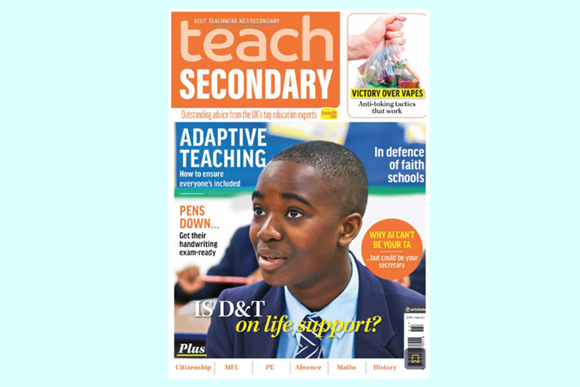D&T Free Webinars go live: Keeping our Community Together
Published 8th October 2020
D&T Free Webinar Autumn series
Our free webinar series continued this week with a varied schedule available to book on our website. Some will be available for members only and others will also be for non-members. They will encourage the D&T community to engage effectively and will cover a range of topics; D&T Departmental tours from different schools around the country, through to networking events and Q&A's with experts around important aspects of D&T, for example, Non-Examined Assessments (NEA). Scroll down to see the Autumn schedule.
This week's webinar discussed how schools across the country have been 'Coping with Covid-19', and the impact it has had this term. Feedback from the 30 September event was incredibly positive from teachers, citing how real the need is for sharing and learning from other D&T teachers experiences. For those who were not able to make it here is a summary of the discussion.
Coping with Covid-19 – D&T Discussion Summary
The Design & Technology Association hosted a successful, fully-booked free webinar which gave teachers the opportunity to discuss and exchange their personal experiences of teaching D&T during this term so far, within the COVID-19 climate.
Tony Ryan CEO of the Design & Technology Association facilitated an informal discussion which dealt with a range of topics around delivering inspiring D&T in the current climate. Attendees found the experience of sharing ideas and concerns extremely helpful; in difficult times it is more important than ever to connect and share concerns and best-practice.
Physical Changes
One of the areas which has seen a significant degree of change is the physical set up of D&T classrooms, with the introduction of workshop screens, visors, hand sanitisers Etc. Many secondary school leadership teams have taken the decision to stop all practical work and other schools have had their workshop lessons moved to maths and English rooms in order to allow students to remain within year group bubbles. Some are enabling years 10 and above to have the ability to utilise the D&T workshops. The general feeling within the group was that this was manageable now, but there are concerns that after Christmas pupils would start to miss key learning on machines and gaps will start to appear in the more practical aspects of the subject. One must question why it is felt that, with the right precautions taken, the workshop facilities cannot be utilised with key groups?
Primary teachers present are also feeling the strain as they are challenged to develop purposeful activities that can be carried out without the use of tools and without the need for pupils to move around the classroom. Younger children find it harder to understand why they cannot socialise with friends and need constant reminding. The Association is looking at this and will set some advice this month.
Creativity has changed
A perhaps surprising outcome experienced by some of the teachers present, is the burgeoning creativity from pupils which appears, in some cases at least, to be because of the removal of the “making” element of D&T. Dave Bausor, Ely College, said this removal “released the shackles enabling creativity to take centre stage, which has been liberating to students”. There was some discussion on the webinar that for some students, the fact that they know that they will not be expected to make or perhaps even prototype their final designs, has empowered students to concentrate more fully on identifying the real issues and then exploring a range of possible solutions. We are all blighted by glass ceilings placed on the design process limited by our ability to make or prototype an end product.
This may be seen as encouraging, at least in the short term, as teachers have the opportunity to set tasks and hold design conversations with students to stretch their concept of the current situation and show how design can provide the solutions. Design and Technology is perfectly placed to open meaningful conversations with students around COVID-19. Students want to discuss it and we can provide a perfect context for them to air their thoughts, views, and concerns.
Challenges
An important point made was that teacher and student well-being and positive mental health must be a major consideration. Some staff are understandably nervous and that is a completely 'normal' reaction. Without networks, single person departments can feel completely isolated. It is psychologically difficult to follow strict distancing rules in your personal life and to then enter a school environment where it could feel that you are putting yourself in the front line and your families at potential risk. Teachers need a forum, such as this webinar, to share their concerns and to learn from each other.
One teacher mentioned “School is like going into a parallel universe which is difficult to rationalise with myself, let alone with the kids”. A good point made, especially with the rule of six being applied in wider society but at school, they are in an environment where they are in class or year bubbles. In a school with upwards of 1500 pupils they may be in year group bubbles of 240 plus.
Class sizes, a constant area of concern for our subject, is even more so within the pandemic. Some teachers are working with classes of 30 or more, when workshop guidance is no more than 20This makes managing a COVID-safe workshop environment virtually impossible.
A primary school teacher explained how their food classes were moved into the school hall where practical lessons could take place in a socially distanced environment, with teacher demonstrations rather than students making the dish. The hope being that pupils would make the food themselves, when at home. But she was also keenly aware that it cannot be assumed that all students and parents have the financial means to do this and as educators, we need to be acutely aware not to place parents who may already be experiencing financial hardship in an even more difficult position.
Motivation
Some of the teachers shared their worry of keeping pupils motivated long term, if the situation continues into the next year. Year 11 pupils were particularly at risk of de-motivation and with many asking why they need to work hard and revise when they might not be taking their examinations in the summer. But this in turn confirms the importance that student’s complete homework, the NEA and other coursework to the highest possible standard at all times, as this work may be used to grade them if examinations are indeed not possible.
Have you been having the conversation in your school regarding how to stretch and monitor pupils if this situation continues in the long-term? A number of suggestions were made but you may have many more, and we would love to hear them. Some schools set a number of intervention sessions to ensure all pupils who are struggling can be brought up to speed, but many teachers were keen to explore how to stetch and challenge the more able pupils and so keep them motivated.
The webinar brought together a wide variety of personal experiences from those currently teaching D&T. It is seen as a positive step to have somewhere to share ideas.
We know and can assure you all, that D&T teachers around the country are in the same position but are doing their best to continue to deliver inspiring D&T lessons in challenging times.
It will be interesting to see how things have developed by the time of the next “Coping with Covid” seminar in February 2021. See you there.
Webinar Autumn 2020 Schedule - Book your place
- 20 Oct - Putting Projects on a Page into Action Webinar (Full)
- 3 Nov - Take a Tour of Ely College D&T Department
- 23 Nov - Putting Projects on a Page into Action Webinar
- 1 Dec - Q&A with D&T experts on Non-Examined Assessment (NEA) 2020/21
- 13 Dec - Planning your D&T Curriculum into 2021 and Beyond



